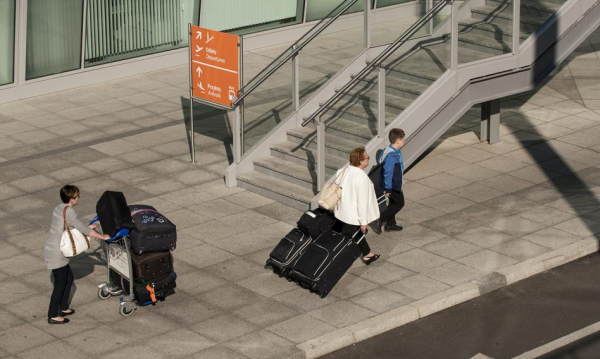In 2024, 19,500 people who had previously lived abroad registered for permanent residence in Poland. That's 30% more than the year before, according to data from the Central Statistical Office (GUS). The rising cost of living in Western Europe, the lack of family support, and the changing Polish labor market are causing emigrants to pack their bags in the opposite direction. “We earned more, but everything cost twice as much. In Poland, we have a home, grandparents to help with the children, and stability,” say those who decided to return.


Just a few years ago, they emigrated en masse in search of better earnings and life prospects. Today, they are increasingly packing their bags for the other side. For many Poles, returning to their homeland after years of emigration is becoming a rational, and also economic, choice .
“I moved to the UK 10 years ago with my then-girlfriend. The reason was, of course, the better pay. We got married there and had our two children,” Łukasz from Łódź tells Bankier.pl. “However, it turned out that working and raising children in a place where there's no chance of family support can be quite difficult. That's why we decided that if one of us found a job in Poland, we would return. My wife was the first, and I followed shortly after. We're generally happy, even though we earned much more in the self-employed sector. However, our daily living costs there were also much higher.”
Advertisement See also: Take part in our stock market multi-thlon! Disciplines: sprint for stocks, dive into ETFs, and push your wallet for the prize.
More people arrive than leave
Data from the Central Statistical Office (GUS) show that the number of Poles returning from emigration is steadily growing. In 2024, 19,500 people who had previously lived abroad registered for permanent residence in Poland. This is a staggering 30% more than in 2023. Meanwhile, the net migration rate for permanent residence was +9,300, meaning that the number of people returning to Poland significantly exceeds the number of those leaving.
According to Magdalena Dąbrowska, vice-president of the Progres Group, who analyzed data on the return of Poles from emigration, this phenomenon is systematically growing.
“This is a continuation of a trend we've been observing for several years,” Magdalena Dąbrowska tells Bankier.pl. ” Since 2016, more people are coming to Poland than leaving. Previously, for decades, the proportions were reversed. At the same time, the nature of migration is changing. Instead of long-term departures, we're seeing more and more seasonal and rotational mobility. Our data shows that as many as 75% of Poles working in the Netherlands, for example, stay there for less than nine months, 40% of whom return after just one to three months, and another 35% after working for four to nine months. Just 10% stay for one to five years, and only about 5% for longer than five years. Only a few decide to settle there permanently.”
Poles are returning from Germany
Data from other sources also provide further confirmation of this trend. According to statistics from the German office Destatis, in 2024 more Poles left Germany than moved there—a symbolic but significant sign of a shift in migration trends. Meanwhile, data from the Central Statistical Office (GUS) indicate that approximately 10,000 people return to Poland each year, and this number is growing.
Meanwhile, a report from the Clicktrans platform, which analyzes the relocation destinations of Poles based on nearly 70,000 orders completed from 2011 to 2024, shows that last year there were more moves to Poland than out of the country. The return rate increased by 5 percentage points compared to the previous year, reaching 66%. Currently, the percentage of people leaving Poland is 34%.
The geography of migration is also changing. In 2024, over 5,700 people settled in rural areas – demonstrating that it's not just cities that attract returnees. Smaller towns are gaining in importance, especially when they offer a good quality of life and convenient access to work. This is particularly important in the context of a labor market that is also growing rapidly outside large urban areas.
Quality of life is more important than money
According to the representative of the Progres Group, many factors influence the decision to return – both personal and external.
“Increasingly, people who previously considered emigrating permanently are changing their minds. The reason is not only a longing for family or social ties in Poland, but also the real difficulties of living abroad, such as high living costs, difficulties with integration, limited access to public services, and uncertainty in the job market,” says Magdalena Dąbrowska. “At the same time, mentalities are changing. Poles are increasingly willing to choose the rotation model, which allows them to work abroad for only part of the year and maintain permanent ties with their home country. This is a particularly attractive option for those who want to combine higher earnings with proximity to family and friends, and the stability that comes with living in familiar surroundings. There's a clear shift toward quality of life, not just the purely financial aspects of emigration.”
A chance for a good job in the country
According to experts, the condition of the domestic labor market also significantly influences Poles' return to Poland. Employment stability and access to well-paid work in a familiar environment, without language barriers, and with a social support network are strong arguments for returning to Poland. At the same time, the growing maturity of the labor market means that people with foreign experience, the ability to work in international structures, and knowledge of foreign languages are not only welcomed but often sought after.
“Poland offers significantly more stable and attractive employment opportunities today than even a few years ago. These opportunities are emerging both outside the largest metropolitan areas and within the cities themselves, where the new technology sector, IT, renewable energy, e-commerce, and modern financial services are all dynamically developing. All of this means that people returning from emigration have the opportunity to find employment that matches their qualifications and ambitions, often at a level that was out of reach just a few years ago,” explains Magdalena Dąbrowska.
A foreign language and experience gained abroad are useful
According to data from the Progres Group, people returning to Poland take up jobs in both operational sectors – such as production, warehousing, and logistics – as well as specialist or managerial professions. Key factors here include their qualifications, professional experience gained abroad, and knowledge of foreign languages or a specific market.
“For many employers, such candidates are a significant asset: they are flexible, have international experience, and often have a better understanding of the expectations of foreign clients or business partners,” says Magdalena Dąbrowska. “For those with technical, linguistic, or managerial skills, returning to Poland often means taking on a well-paid, responsible position, even within international companies. Meanwhile, those without specialized education can expect a quick return to work in sectors facing labor shortages, especially if they have experience in similar roles abroad,” she adds.
Remote work has changed the rules of the game
The biggest change enabling these returns is the rise of remote and hybrid work. This allows Poles to remain with foreign companies while performing their duties from home. This allows them to count on higher foreign earnings while also benefiting from the lower cost of living in Poland.
“I worked for five years at an IT company in Munich. When I realized I could only work remotely, I decided to return home. This allows me to earn in euros and spend in złoty, which is still very profitable,” Piotr from Wrocław tells Bankier.pl.
Economic patriotism is growing
Many Poles are also prompted to return by the rising cost of living in countries like Germany, the Netherlands, and the United Kingdom. This is compounded by growing immigration pressure, uncertainty surrounding migration policies, and the economic slowdown, which is particularly affecting temporary workers. Meanwhile, according to Dr. Paweł Dobrzański, Professor at the Wrocław University of Economics, Poland is considered one of the most successful examples of economic transformation.
“Many economists even call it a 'regional leader' and an example of 'transformational success,' which is also noticed by people living abroad,” Dr. Paweł Dobrzański tells Bankier.pl. ” GDP growth between 1989 and 2024 exceeded 300%, the highest rate in Central and Eastern Europe. The increased number of returns to Poland is influenced by rising wages in Poland, lower costs of living, and growing economic patriotism, all supported by programs that facilitate a return to work. Poles also highly value Polish-language education for children and access to free healthcare. Poland is beginning to benefit from 'emigration capital.' The diaspora effect, which intensified between 2020 and 2025, is noticeable here. It has economic, social, and cultural dimensions. Poland is also considered a very safe and culturally homogeneous country, which, in the context of migration problems in other European countries, is a clear advantage,” the scientist adds.
Not every comeback is easy
Although the number of returns is increasing, not everyone manages to quickly re-establish themselves in Poland. According to Maciej Domagała, a sociologist specializing in re-emigration, returning to Poland after several or a dozen years abroad can be difficult .
“There are usually two groups of returnees. The first are people who have lived and worked in another country for many years, are just retiring, and want to spend that time in their homeland, living off benefits they receive from abroad. These people are in a relatively good financial situation, but they still face several challenges. One is that, having been part of another community for a long time, they have adapted to it—to its culture, customs, legal system, and political situation, which are simply different in Poland, and upon returning, one has to adapt. Furthermore, familiar places are not necessarily familiar anymore. Where a park used to be, a new building might now stand,” Maciej Domagała tells Bankier.pl.
“On the other hand, professionally active people face even more challenges. Many of them didn't consider their emigration as part of building their careers, often taking elementary jobs abroad. Upon their return, they expect to be employed in a position commensurate with their education. However, the problem of career breaks arises, and with today's technological, business, and social progress, this means a significant skills gap. For example, a marketing specialist who went to England to work on a construction site for several years and, when he wants to return to his position five years later, it turns out to be unrealistic,” he adds.
Possible specific support for return
Returnees can also count on government support for their return to Poland . Among the forms of assistance offered to them is the “Return Relief” tax relief. Only select taxpayers are eligible for this measure. The main criterion is that they must not have resided in Poland for at least three years before returning to Poland. In this case, their income will be tax-exempt up to a maximum of PLN 85,528 in a given year. This relief can be used for four consecutive years.
People returning to Poland permanently can also receive a settlement voucher issued by district labor offices. Its value is up to twice the average salary, currently approximately PLN 15,000 gross. These funds are non-refundable if the person has worked in Poland for at least six months.
Some voivodeships also have EU projects supporting returns from abroad, particularly under Regional Operational Programmes and European Funds. These projects offer:
- reimbursement of moving costs,
- subsidy for renting an apartment
- covering the costs of recognition of professional qualifications (translations, administrative fees).
- relocation vouchers, e.g. for vocational, language or training courses.
In turn, non-governmental organizations also offer material assistance (e.g. school supplies, furniture, household appliances) and free legal advice and housing counseling.
More and more returns are in the horizon
There are many indications that the return trend will continue to strengthen, especially among younger generations and specialists who can work remotely. Despite its challenges, Poland is becoming more attractive in terms of quality of life, especially compared to the increasingly expensive and less accessible Western metropolises.





